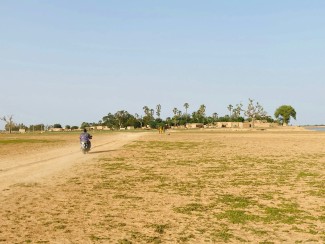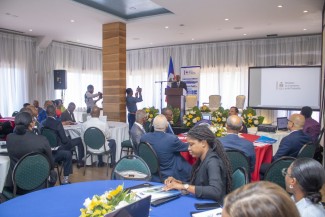The Ambassador and Permanent Representative of the Republic of Vanuatu to the WTO talks graduation journey, Covid-19 and climate resilience, and how leaving the LDC category means the work as only just started.
The COVID-19 pandemic has brought significant economic and social consequences to countries around the world. In many cases, this crisis has reversed the progress that had been painstakingly achieved. Taking all these factors into account could you comment on Vanuatu's economic performance over the past several years and how has the EIF's support contributed to your journey to graduation?
Vanuatu's economic performance prior to COVID-19 was on the positive side. We were experiencing a GDP growth of 4 per cent each year. At the beginning of the pandemic in 2020, despite the disruptions in imports, exports and supply chain due to border closures, the domestic and foreign direct investments continued to grow, and Vanuatu still experienced economic growth. Now, in 2022, we are starting to experience the effects from the pandemic. However, we have been very lucky to have EIF support for the past few years. EIF's contribution is a catalyst to the programmes and projects that are implemented in Vanuatu. If we didn't have the support from EIF, as part of this process, we might not have seen some of those activities that went towards the graduation accreditation process. I think the future of Vanuatu is good, but we have to be mindful of the situation and ensure that we take on the challenges and be innovative in our management.
Despite severe setbacks due to accelerating climate change and the pandemic, Vanuatu managed to successfully graduate from the LDCs' list in December 2020. However, it still remains highly vulnerable to external shocks, with this in mind could you highlight the key challenges Vanuatu currently faces?
Vanuatu's graduation from the LDC list in 2020 was celebrated by our citizens. In 2020, Vanuatu also celebrated 40 years of independence. It was a national celebration. In 1980, we took our place among nations of the world as an independent country, and 40 years later we graduated from the LDC list. For us, as a nation, it was an immense achievement. There was a lot of confidence in our graduation and seeing Vanuatu taking its place amongst nations affirming that we were prepared for the challenges ahead. Having said that, our vulnerabilities have not gone away, they remain there. Vanuatu's economy is currently facing contractions, particularly in the tourism and transport sectors. Innovative policies and continuous reforms must take place, such as reinvigorating our domestic productive sector, enabling e-commerce and ensuring food security.
The changes are happening today, and we need to re-emphasise what areas Vanuatu should now concentrate on. We are seeing a lot of refocusing on the productive sector. It's quite exciting and interesting that these changes are happening in Vanuatu. And I think the biggest opportunity for us is to engage in a programme of socio-economic reforms as part of our graduation but also as part of the changing environment around us.
In the face of these challenges and opportunities, how relevant are the EIF's operational principles to the needs of a recently graduated LDC, such as Vanuatu?
EIF is a multilateral partnership dedicated exclusively to assisting LDCs to use trade as an engine for growth. We are mindful of the EIF's objectives and creating partnerships with our partners, other countries, and international and regional agencies. Partnership is a very important part of what EIF is bringing to us. EIF has supported programmes and projects to improve our ability to increase the production of goods and services not only for the external market but also for our domestic market. In the food security area, you cannot export food until you provide food for your population. First, we need to secure this and then talk about exporting to other countries. This requires addressing domestic, fiscal and e-commerce infrastructure, such as, government services, laws and regulations, processes and procedures. What we're seeing today is that EIF, our partner countries, and agencies are supporting us and our efforts.
The EIF ensures that ownership is crucial for successful programme completion. Vanuatu set its own strategy for poverty reduction, aligned with the UN 2030 Agenda, and EIF and all other supporting countries and agencies collaborate to support this strategy. The EIF's interventions in Vanuatu are testaments of that commitment to country-ownership and collaboration with those partners with no overlaps, no duplication and no waste.
Vanuatu has managed to do what no other Pacific Island country yet has, to take its customs and biosecurity processes online with support of the UNCTAD Electronic Single Window Project. Vanuatu is also a beneficiary of the EIF regional Quality Infrastructure project with the Pacific Island Forum Secretariat, and UNCTAD and UPU postal and custom harmonization project. How important are these projects for Pacific trade and how have they benefited Vanuatu?
These projects are very important building blocks of Vanuatu's development. They are the necessary basis to facilitate and grow our domestic processes and external trade. They create efficiencies in procedures and processes and increase productivity in the economy. They are important for the development of the private sector, micro-, small- and medium-sized enterprises, big businesses, and non-state actors. The whole spectrum of players is benefiting from these initiatives. The support provided by UNCTAD and EIF has been immense.
Vanuatu’s graduation from the LDCs' list was very impressive especially given that, over the past few years, not only has it weathered significant economic and social fallout from repeated natural disasters, but also a major drop in tourism revenue due to border closures during the global COVID-19 pandemic. At this time of exacerbated economic vulnerabilities, some have questioned whether this was the right time for Vanuatu to leave its LDC status behind. However, Vanuatu has proved that it is well equipped to move forward and continue this developmental path. Going forward how do you see Vanuatu's coming journey towards sustainable development?
There is never a good time to graduate. Vulnerabilities will never disappear. Our smallness, the tyranny of distance from our external markets, and natural disasters force us to become resilient, to adjust and ensure that we are prepared for everything, and that we can respond and mitigate. The COVID-19 pandemic and the consequential drop in performance of some of our major economic sectors, including tourism, had significant implications on Vanuatu. So, was it a good time for Vanuatu's graduation? I think that question has already been answered by Vanuatu, we were ready and despite the circumstances back then, today and in the future, we will take on all the responsibilities. There's no doubt about that. Now, we have to think about looking ahead and making sure that we are prepared for anything that comes our way. Graduation doesn't mean that we've done a good job. It tells us that we have done a good job, but we can do better.
With Bhutan, Angola, the Solomon Islands and São Tomé and Príncipe scheduled for graduation and another seven LDCs being considered in the coming years, there’s a lot that can be learned from Vanuatu’s early preparation, bravery, adaptability and focus on partnerships to ensure a smooth graduation process. What can you advise future graduates?
Everyone has different circumstances and situations, so we can only speak generally. We have confidence in our friends from Bhutan, Angola, the Solomon Islands and São Tomé and Príncipe and other LDCs that have strong graduation strategies. If we remind ourselves to be innovative every day, then the country will continue to grow and grow. I can only encourage them to have a good transition strategy and also be engaged with partners and friends because they will contribute to their development aspirations.
If you would like to reuse any material published here, please let us know by sending an email to EIF Communications: eifcommunications@wto.org.



